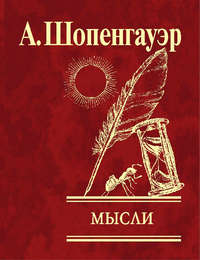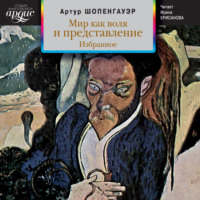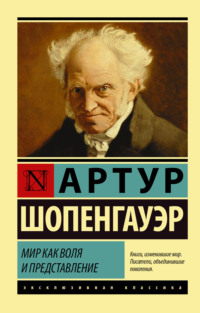 полная версия
полная версияThe World as Will and Idea (Vol. 2 of 3)
If now it is said of one man, “He has a good heart, though a bad head,” but of another, “He has a very good head, yet a bad heart,” every one feels that in the first case the praise far outweighs the blame – in the other case the reverse. Answering to this, we see that if some one has done a bad deed his friends and he himself try to remove the guilt from the will to the intellect, and to give out that faults of the heart were faults of the head; roguish tricks they will call errors, will say they were merely want of understanding, want of reflection, light-mindedness, folly; nay, if need be, they will plead a paroxysm, momentary mental aberration, and if a heavy crime is in question, even madness, only in order to free the will from the guilt. And in the same way, we ourselves, if we have caused a misfortune or injury, will before others and ourselves willingly impeach our stultitia, simply in order to escape the reproach of malitia. In the same way, in the case of the equally unjust decision of the judge, the difference, whether he has erred or been bribed, is so infinitely great. All this sufficiently proves that the will alone is the real and essential, the kernel of the man, and the intellect is merely its tool, which may be constantly faulty without the will being concerned. The accusation of want of understanding is, at the moral judgment-seat, no accusation at all; on the contrary, it even gives privileges. And so also, before the courts of the world, it is everywhere sufficient to deliver a criminal from all punishment that his guilt should be transferred from his will to his intellect, by proving either unavoidable error or mental derangement, for then it is of no more consequence than if hand or foot had slipped against the will. I have fully discussed this in the appendix, “Ueber die Intellektuelle Freiheit,” to my prize essay on the freedom of the will, to which I refer to avoid repetition.
Everywhere those who are responsible for any piece of work appeal, in the event of its turning out unsatisfactorily, to their good intentions, of which there was no lack. Hereby they believe that they secure the essential, that for which they are properly answerable, and their true self; the inadequacy of their faculties, on the other hand, they regard as the want of a suitable tool.
If a man is stupid, we excuse him by saying that he cannot help it; but if we were to excuse a bad man on the same grounds we would be laughed at. And yet the one, like the other, is innate. This proves that the will is the man proper, the intellect merely its tool.
Thus it is always only our willing that is regarded as depending upon ourselves, i. e., as the expression of our true nature, and for which we are therefore made responsible. Therefore it is absurd and unjust if we are taken to task for our beliefs, thus for our knowledge: for we are obliged to regard this as something which, although it changes in us, is as little in our power as the events of the external world. And here, also, it is clear that the will alone is the inner and true nature of man; the intellect, on the contrary, with its operations, which go on as regularly as the external world, stands to the will in the relation of something external to it, a mere tool.
High mental capacities have always been regarded as the gift of nature or the gods; and on that account they have been called Gaben, Begabung, ingenii dotes, gifts (a man highly gifted), regarding them as something different from the man himself, something that has fallen to his lot through favour. No one, on the contrary, has ever taken this view of moral excellences, although they also are innate; they have rather always been regarded as something proceeding from the man himself, essentially belonging to him, nay, constituting his very self. But it follows now from this that the will is the true nature of man; the intellect, on the other hand, is secondary, a tool, a gift.
Answering to this, all religions promise a reward beyond life, in eternity, for excellences of the will or heart, but none for excellences of the head or understanding. Virtue expects its reward in that world; prudence hopes for it in this; genius, again, neither in this world nor in that; it is its own reward. Accordingly the will is the eternal part, the intellect the temporal.
Connection, communion, intercourse among men is based, as a rule, upon relations which concern the will, not upon such as concern the intellect. The first kind of communion may be called the material, the other the formal. Of the former kind are the bonds of family and relationship, and further, all connections that rest upon any common aim or interest, such as that of trade or profession, of the corporation, the party, the faction, &c. In these it merely amounts to a question of views, of aims; along with which there may be the greatest diversity of intellectual capacity and culture. Therefore not only can any one live in peace and unity with any one else, but can act with him and be allied to him for the common good of both. Marriage also is a bond of the heart, not of the head. It is different, however, with merely formal communion, which aims only at an exchange of thought; this demands a certain equality of intellectual capacity and culture. Great differences in this respect place between man and man an impassable gulf: such lies, for example, between a man of great mind and a fool, between a scholar and a peasant, between a courtier and a sailor. Natures as heterogeneous as this have therefore trouble in making themselves intelligible so long as it is a question of exchanging thoughts, ideas, and views. Nevertheless close material friendship may exist between them, and they may be faithful allies, conspirators, or men under mutual pledges. For in all that concerns the will alone, which includes friendship, enmity, honesty, fidelity, falseness, and treachery, they are perfectly homogeneous, formed of the same clay, and neither mind nor culture make any difference here; indeed here the ignorant man often shames the scholar, the sailor the courtier. For at the different grades of culture there are the same virtues and vices, emotions and passions; and although somewhat modified in their expression, they very soon mutually recognise each other even in the most heterogeneous individuals, upon which the similarly disposed agree and the opposed are at enmity.
Brilliant qualities of mind win admiration, but never affection; this is reserved for the moral, the qualities of the character. Every one will choose as his friend the honest, the good-natured, and even the agreeable, complaisant man, who easily concurs, rather than the merely able man. Indeed many will be preferred to the latter, on account of insignificant, accidental, outward qualities which just suit the inclination of another. Only the man who has much mind himself will wish able men for his society; his friendship, on the other hand, he will bestow with reference to moral qualities; for upon this depends his really high appreciation of a man in whom a single good trait of character conceals and expiates great want of understanding. The known goodness of a character makes us patient and yielding towards weaknesses of understanding, as also towards the dulness and childishness of age. A distinctly noble character along with the entire absence of intellectual excellence and culture presents itself as lacking nothing; while, on the contrary, even the greatest mind, if affected with important moral faults, will always appear blamable. For as torches and fireworks become pale and insignificant in the presence of the sun, so intellect, nay, genius, and also beauty, are outshone and eclipsed by the goodness of the heart. When this appears in a high degree it can make up for the want of those qualities to such an extent that one is ashamed of having missed them. Even the most limited understanding, and also grotesque ugliness, whenever extraordinary goodness of heart declares itself as accompanying them, become as it were transfigured, outshone by a beauty of a higher kind, for now a wisdom speaks out of them before which all other wisdom must be dumb. For goodness of heart is a transcendent quality; it belongs to an order of things that reaches beyond this life, and is incommensurable with any other perfection. When it is present in a high degree it makes the heart so large that it embraces the world, so that now everything lies within it, no longer without; for it identifies all natures with its own. It then extends to others also that boundless indulgence which otherwise each one only bestows on himself. Such a man is incapable of becoming angry; even if the malicious mockery and sneers of others have drawn attention to his own intellectual or physical faults, he only reproaches himself in his heart for having been the occasion of such expressions, and therefore, without doing violence to his own feelings, proceeds to treat those persons in the kindest manner, confidently hoping that they will turn from their error with regard to him, and recognise themselves in him also. What is wit and genius against this? – what is Bacon of Verulam?
Our estimation of our own selves leads to the same result as we have here obtained by considering our estimation of others. How different is the self-satisfaction which we experience in a moral regard from that which we experience in an intellectual regard! The former arises when, looking back on our conduct, we see that with great sacrifices we have practised fidelity and honesty, that we have helped many, forgiven many, have behaved better to others than they have behaved to us; so that we can say with King Lear, “I am a man more sinned against than sinning;” and to its fullest extent if perhaps some noble deed shines in our memory. A deep seriousness will accompany the still peace which such a review affords us; and if we see that others are inferior to us here, this will not cause us any joy, but we will rather deplore it, and sincerely wish that they were as we are. How entirely differently does the knowledge of our intellectual superiority affect us! Its ground bass is really the saying of Hobbes quoted above: Omnis animi voluptas, omnisque alacritas in eo sita est, quad quis habeat, quibuscum conferens se, possit magnifice sentire de se ipso. Arrogant, triumphant vanity, proud, contemptuous looking down on others, inordinate delight in the consciousness of decided and considerable superiority, akin to pride of physical advantages, – that is the result here. This opposition between the two kinds of self-satisfaction shows that the one concerns our true inner and eternal nature, the other a more external, merely temporal, and indeed scarcely more than a mere physical excellence. The intellect is in fact simply the function of the brain; the will, on the contrary, is that whose function is the whole man, according to his being and nature.
If, looking without us, we reflect that ὁ βιος βραχυς, ἡ δε τεχνη μακρα (vita brevis, ars longa), and consider how the greatest and most beautiful minds, often when they have scarcely reached the summit of their power, and the greatest scholars, when they have only just attained to a thorough knowledge of their science, are snatched away by death, we are confirmed in this, that the meaning and end of life is not intellectual but moral.
The complete difference between the mental and moral qualities displays itself lastly in the fact that the intellect suffers very important changes through time, while the will and character remain untouched by it. The new-born child has as yet no use of its understanding, but obtains it within the first two months to the extent of perception and apprehension of the things in the external world – a process which I have described more fully in my essay, “Ueber das Sehn und die Farben,” p. 10 of the second (and third) edition. The growth of reason to the point of speech, and thereby of thought, follows this first and most important step much more slowly, generally only in the third year; yet the early childhood remains hopelessly abandoned to silliness and folly, primarily because the brain still lacks physical completeness, which, both as regards its size and texture, it only attains in the seventh year. But then for its energetic activity there is still wanting the antagonism of the genital system; it therefore only begins with puberty. Through this, however, the intellect has only attained to the capacity for its psychical improvement; this itself can only be won by practice, experience, and instruction. Thus as soon as the mind has escaped from the folly of childhood it falls into the snares of innumerable errors, prejudices, and chimeras, sometimes of the absurdest and crudest kind, which it obstinately sticks to, till experience gradually removes them, and many of them also are insensibly lost. All this takes many years to happen, so that one grants it majority indeed soon after the twentieth year, yet has placed full maturity, years of discretion, not before the fortieth year. But while this psychical education, resting upon help from without, is still in process of growth, the inner physical energy of the brain already begins to sink again. This has reached its real culminating point about the thirtieth year, on account of its dependence upon the pressure of blood and the effect of the pulsation upon the brain, and through this again upon the predominance of the arterial over the venous system, and the fresh tenderness of the brain fibre, and also on account of the energy of the genital system. After the thirty-fifth year a slight diminution of the physical energy of the brain becomes noticeable, which, through the gradually approaching predominance of the venous over the arterial system, and also through the increasing firmer and drier consistency of the brain fibre, more and more takes place, and would be much more observable if it were not that, on the other hand, the psychical perfecting, through exercise, experience, increase of knowledge, and acquired skill in the use of it, counteracts it – an antagonism which fortunately lasts to an advanced age, for the brain becomes more and more like a worn-out instrument. But yet the diminution of the original energy of the intellect, resting entirely upon organic conditions, continues, slowly indeed, but unceasingly: the faculty of original conception, the imagination, the plastic power, the memory, become noticeably weaker; and so it goes on step by step downwards into old age, garrulous, without memory, half-unconscious, and ultimately quite childish.
The will, on the contrary, is not affected by all this becoming, this change and vicissitude, but is from beginning to end unalterably the same. Willing does not require to be learned like knowing, but succeeds perfectly at once. The new-born child makes violent movements, rages, and cries; it wills in the most vehement manner, though it does not yet know what it wills. For the medium of motives, the intellect, is not yet fully developed. The will is in darkness concerning the external world, in which its objects lie, and now rages like a prisoner against the walls and bars of his dungeon. But little by little it becomes light: at once the fundamental traits of universal human willing, and, at the same time, the individual modification of it here present, announce themselves. The already appearing character shows itself indeed at first in weak and uncertain outline, on account of the defective service of the intellect, which has to present it with motives; but to the attentive observer it soon declares its complete presence, and in a short time it becomes unmistakable. The characteristics appear which last through the whole of life; the principal tendencies of the will, the easily excited emotions, the ruling passion, declare themselves. Therefore the events at school stand to those of the future life for the most part as the dumb-show in “Hamlet” that precedes the play to be given at the court, and foretells its content in the form of pantomime, stands to the play itself. But it is by no means possible to prognosticate in the same way the future intellectual capacities of the man from those shown in the boy; rather as a rule the ingenia præcocia, prodigies, turn out block-heads; genius, on the contrary, is often in childhood of slow conception, and comprehends with difficulty, just because it comprehends deeply. This is how it is that every one relates laughing and without reserve the follies and stupidities of his childhood. For example, Goethe, how he threw all the kitchen crockery out of the window (Dichtung und Wahrheit, vol. i. p. 7); for we know that all this only concerns what changes. On the other hand, a prudent man will not favour us with the bad features, the malicious or deceitful actions, of his youth, for he feels that they also bear witness to his present character. I have been told that when Gall, the phrenologist and investigator of man, had to put himself into connection with a man as yet unknown to him, he used to get him to speak about his youthful years and actions, in order, if possible, to gather from these the distinctive traits of his character; because this must still be the same now. This is the reason why we are indifferent to the follies and want of understanding of our youthful years, and even look back on them with smiling satisfaction, while the bad features of character even of that time, the ill-natured actions and the misdeeds then committed exist even in old age as inextinguishable reproaches, and trouble our consciences. Now, just as the character appears complete, so it remains unaltered to old age. The advance of age, which gradually consumes the intellectual powers, leaves the moral qualities untouched. The goodness of the heart still makes the old man honoured and loved when his head already shows the weaknesses which are the commencement of second childhood. Gentleness, patience, honesty, veracity, disinterestedness, philanthropy, &c., remain through the whole life, and are not lost through the weaknesses of old age; in every clear moment of the worn-out old man they come forth undiminished, like the sun from the winter clouds. And, on the other hand, malice, spite, avarice, hard-heartedness, infidelity, egoism, and baseness of every kind also remain undiminished to our latest years. We would not believe but would laugh at any one who said to us, “In former years I was a malicious rogue, but now I am an honest and noble-minded man.” Therefore Sir Walter Scott, in the “Fortunes of Nigel,” has shown very beautifully, in the case of the old usurer, how burning avarice, egoism, and injustice are still in their full strength, like a poisonous plant in autumn, when the intellect has already become childish. The only alterations that take place in our inclinations are those which result directly from the decrease of our physical strength, and with it of our capacities for enjoyment. Thus voluptuousness will make way for intemperance, the love of splendour for avarice, and vanity for ambition; just like the man who before he has a beard will wear a false one, and later, when his own beard has become grey, will dye it brown. Thus while all organic forces, muscular power, the senses, the memory, wit, understanding, genius, wear themselves out, and in old age become dull, the will alone remains undecayed and unaltered: the strength and the tendency of willing remains the same. Indeed in many points the will shows itself still more decided in age: thus, in the clinging to life, which, it is well known, increases; also in the firmness and persistency with regard to what it has once embraced, in obstinacy; which is explicable from the fact that the susceptibility of the intellect for other impressions, and thereby the movement of the will by motives streaming in upon it, has diminished. Hence the implacable nature of the anger and hate of old persons —
“The young man's wrath is like light straw on fire,But like red-hot steel is the old man's ire.”– Old Ballad.From all these considerations it becomes unmistakable to the more penetrating glance that, while the intellect has to run through a long series of gradual developments, but then, like everything physical, must encounter decay, the will takes no part in this, except so far as it has to contend at first with the imperfection of its tool, the intellect, and, again, at last with its worn-out condition, but itself appears perfect and remains unchanged, not subject to the laws of time and of becoming and passing away in it. Thus in this way it makes itself known as that which is metaphysical, not itself belonging to the phenomenal world.
9. The universally used and generally very well understood expressions heart and head have sprung from a true feeling of the fundamental distinction here in question; therefore they are also apt and significant, and occur in all languages. Nec cor nec caput habet, says Seneca of the Emperor Claudius (Ludus de morte Claudii Cæsaris, c. 8). The heart, this primum mobile of the animal life, has with perfect justice been chosen as the symbol, nay, the synonym, of the will, as the primary kernel of our phenomenon, and denotes this in opposition to the intellect, which is exactly identical with the head. All that, in the widest sense, is matter of the will, as wish, passion, joy, grief, goodness, wickedness, also what we are wont to understand under “Gemüth,” and what Homer expresses through φιλον ἠτορ, is attributed to the heart. Accordingly we say: He has a bad heart; – his heart is in the thing; – it comes from his heart; – it cut him to the heart; – it breaks his heart; – his heart bleeds; – the heart leaps for joy; – who can see the heart of man? – it is heart-rending, heart-crushing, heart-breaking, heart-inspiring, heart-touching; – he is good-hearted, hard-hearted, heartless, stout-hearted, faint-hearted, &c. &c. Quite specially, however, love affairs are called affairs of the heart, affaires de cœur; because the sexual impulse is the focus of the will, and the selection with reference to it constitutes the chief concern of natural, human volition, the ground of which I shall show in a full chapter supplementary to the fourth book. Byron in “Don Juan,” c. xi. v. 34, is satirical about love being to women an affair of the head instead of an affair of the heart. On the other hand, the head denotes everything that is matter of knowledge. Hence a man of head, a good head, a fine head, a bad head, to lose one's head, to keep one's head uppermost, &c. Heart and head signifies the whole man. But the head is always the second, the derived; for it is not the centre but the highest efflorescence of the body. When a hero dies his heart is embalmed, not his brain; on the other hand, we like to preserve the skull of the poet, the artist, and the philosopher. So Raphael's skull was preserved in the Academia di S. Luca at Rome, though it has lately been proved not to be genuine; in Stockholm in 1820 the skull of Descartes was sold by auction.33
A true feeling of the real relation between will, intellect, and life is also expressed in the Latin language. The intellect is mens, νους; the will again is animus, which comes from anima, and this from ανεμων. Anima is the life itself, the breath, ψυχη; but animus is the living principle, and also the will, the subject of inclinations, intentions, passions, emotions; hence also est mihi animus, —fert animus, – for “I have a desire to,” also animi causa, &c.; it is the Greek θυμος, the German “Gemüth,” thus the heart but not the head. Animi perturbatio is an emotion; mentis perturbatio would signify insanity. The predicate immortalis is attributed to animus, not to mens. All this is the rule gathered from the great majority of passages; though in the case of conceptions so nearly related it cannot but be that the words are sometimes interchanged. Under ψυχη the Greeks appear primarily and originally to have understood the vital force, the living principle, whereby at once arose the dim sense that it must be something metaphysical, which consequently would not be reached by death. Among other proofs of this are the investigations of the relation between νους and ψυχη preserved by Stobæus (Ecl., Lib. i. c. 51, § 7, 8).









